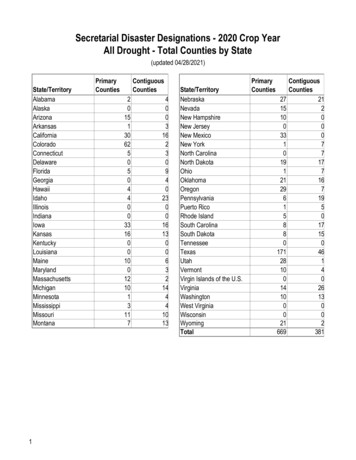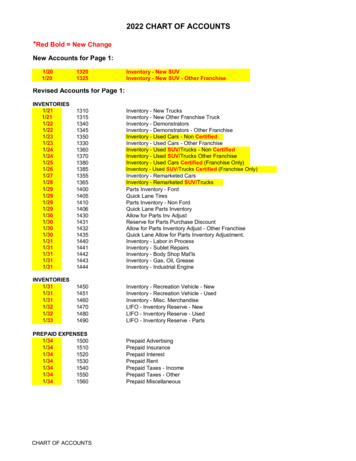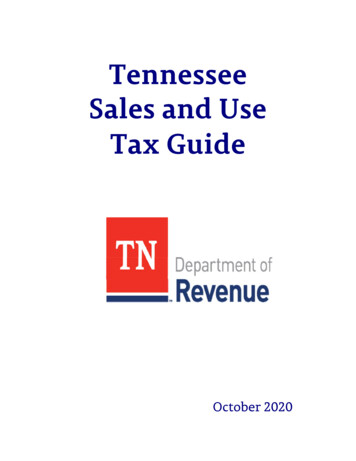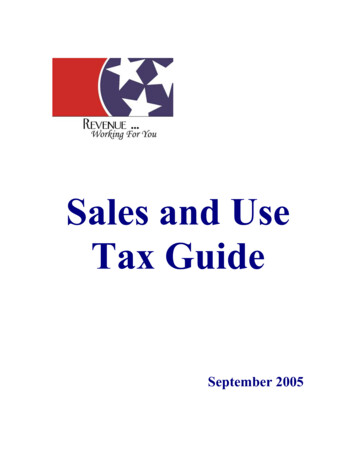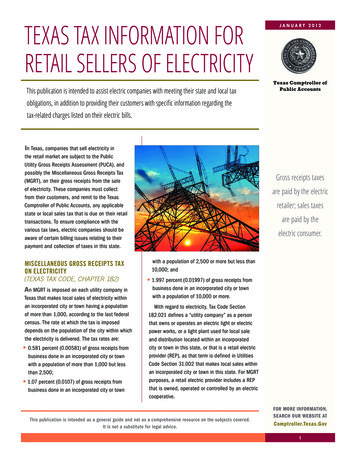
Transcription
TEXAS TAX INFORMATION FORRETAIL SELLERS OF ELECTRICITYThis publication is intended to assist electric companies with meeting their state and local taxJA N UA RY 2 012Texas Comptroller ofPublic Accountsobligations, in addition to providing their customers with specific information regarding thetax-related charges listed on their electric bills.In Texas, companies that sell electricity inthe retail market are subject to the PublicUtility Gross Receipts Assessment (PUCA), andpossibly the Miscellaneous Gross Receipts Tax(MGRT), on their gross receipts from the saleof electricity. These companies must collectfrom their customers, and remit to the TexasComptroller of Public Accounts, any applicablestate or local sales tax that is due on their retailtransactions. To ensure compliance with thevarious tax laws, electric companies should beaware of certain billing issues relating to theirpayment and collection of taxes in this state.MISCELLANEOUS GROSS RECEIPTS TAXON ELECTRICITY(TEXAS TAX CODE, CHAPTER 182)An MGRT is imposed on each utility company inTexas that makes local sales of electricity withinan incorporated city or town having a populationof more than 1,000, according to the last federalcensus. The rate at which the tax is imposeddepends on the population of the city within whichthe electricity is delivered. The tax rates are: 0.581 percent (0.00581) of gross receipts frombusiness done in an incorporated city or townwith a population of more than 1,000 but lessthan 2,500; 1.07 percent (0.0107) of gross receipts frombusiness done in an incorporated city or townGross receipts taxesare paid by the electricretailer; sales taxesare paid by theelectric consumer.with a population of 2,500 or more but less than10,000; and 1.997 percent (0.01997) of gross receipts frombusiness done in an incorporated city or townwith a population of 10,000 or more.With regard to electricity, Tax Code Section182.021 defines a “utility company” as a personthat owns or operates an electric light or electricpower works, or a light plant used for local saleand distribution located within an incorporatedcity or town in this state, or that is a retail electricprovider (REP), as that term is defined in UtilitiesCode Section 31.002 that makes local sales withinan incorporated city or town in this state. For MGRTpurposes, a retail electric provider includes a REPthat is owned, operated or controlled by an electriccooperative.This publication is intended as a general guide and not as a comprehensive resource on the subjects covered.It is not a substitute for legal advice.FOR MORE INFORMATION,SEARCH OUR WEBSITE ATComptroller.Texas.Gov1
texas tax information for Retail Sellers of ElectricityPUBLIC UTILITY GROSS RECEIPTSASSESSMENT ON ELECTRICITY(TEXAS UTILITIES CODE, CHAPTER 16)The PUCA is imposed on each electric utility,A company that collectsa tax reimbursement inerror should refundthe amountto its customer.retail electric provider and electric cooperativethat serves the ultimate consumer in Texas. Theassessment is equal to one-sixth of 1 percent(0.001667) of the electric utility’s, REP’s or electriccooperative’s gross receipts from rates charged tothe ultimate consumer in this state.Utilities Code Section 31.002(6) defines an“electric utility” as a person or river authority thatowns or operates for compensation in this stateequipment or facilities to produce, generate,transmit, distribute, sell or furnish electricity inthis state. The term includes a lessee, trustee orreceiver of an electric utility and a recreationalvehicle park owner who does not comply withUtilities Code, Chapter 184, Subchapter C, withregard to the metered sale of electricity at therecreational vehicle park.Under Section 31.002(17), a “retail electricprovider” is defined as a person who sells electricenergy to retail customers in Texas. A retail electricprovider may not own or operate generation assets.Utilities Code Section 11.003(9) defines an“electric cooperative” as a corporation organizedunder Utilities Code, Chapter 161, or a predecessorstatute to Chapter 161 and operating under thatchapter; or a corporation organized as an electriccooperative in a state other than Texas that hasobtained a certificate of authority to conductaffairs in Texas.CHARGES NOT SUBJECT TOMGRT OR PUCANonbypassable delivery charges such as systembenefit fund fees, nuclear decommission fees andtransition charges are not subject to MGRT or PUCA.CALCULATING AND IDENTIFYING MGRT ORPUCA PASS-THROUGH CHARGESThe following guidelines apply to electric utilities,REPs and electric cooperatives (i.e., electriccompanies) that choose to identify separate passthrough charges on their customers’ retail electricbills. Pass-through charges are gross receipts taxesor assessments imposed on utility companiesthat are passed through to their customers as aline-item charge separate from the charge for theelectricity itself. These guidelines supplement anyother billing requirements established by the PublicUtility Commission of Texas. Pass-through charges must be itemizedand labeled on the customer’s bill as a“reimbursement” of the tax or assessment. Thebilling must not expressly indicate that the chargeis for a tax (that is, the term “tax” should not beused) because of the implication that the tax isimposed on the consumer. A customer may not be billed for reimbursementof a tax or assessment unless the companyactually owes the tax or assessment as the resultof its transaction with that customer. A companythat collects a reimbursement in error shouldrefund the amount of the reimbursement to itscustomer. Failure to do so may subject the utilitycompany to a liability equal to the full amount ofthe reimbursement collected plus any accruedpenalties and interest on the amount collected. The amount of the reimbursement charge must becalculated using the exact rate at which the taxA customer may not be billed forreimbursement of a tax or assessmentunless the company actually owes thetax or assessment as the result of itsFOR MORE INFORMATION,SEARCH OUR WEBSITE ATComptroller.Texas.Gov2transaction with that customer.
texas tax information for Retail Sellers of Electricitythe tax or assessment. The fact that collection ofreimbursement charges increases the company’stax or assessment liability does not mean that thecompany may overbill the reimbursement chargeat a rate that is higher than the actual tax orassessment rate imposed on the company. When calculating the company’s MGRT or PUCAor assessment is imposed on the utility company;any amount charged above that rate must be paidto the state unless it is refunded to the customer.Only the utility company that paid the tax orassessment directly to the state may request arefund from the Comptroller. Any sales tax due on the sales price of theelectricity must be excluded from the calculationof the reimbursement charge. When the MGRT or PUCA is passed through to theretail customer as a reimbursement charge, thecharge becomes a part of the sales price for theelectricity for sales tax purposes and is subjectto state sales and use tax in the same manner asthe charge for the electricity itself. (Refer to the“Collection, Billing and Refund of State or LocalSales Tax on Retail Sales of Electricity” section ofthis publication.)A detailed example showing the correctcalculation of MGRT and PUCA reimbursementcharges, as well as state and local sales tax, isprovided at the end of this publication.CALCULATING A COMPANY’S MGRT ORPUCA LIABILITYThe following guidelines apply to the calculationof a company’s MGRT or PUCA liability when thecompany lists separate pass-through charges onits customers’ retail electric bills. If the MGRT or PUCA is passed through to theretail customer as a reimbursement charge, theamount of the reimbursement must be included inthe company’s gross receipts that are subject toliability, any sales tax collected from customerson behalf of the state must be excluded from thecompany’s gross receipts.MGRT AND PUCA REFUNDSWhen a company collects a reimbursement ofthe MGRT or PUCA in error, the company mustrefund the amount of the reimbursement to itscustomer before it may receive a refund of the taxor assessment from the Comptroller. A customermay not file a refund claim directly with theComptroller to recover such a reimbursement, normay the company assign its refund by issuing anAssignment of Right to Refund (Form 00-985) tothe customer since the customer is not liable forthe payment of the actual MGRT or PUCA.Retail electric customersmay not recoverMGRT or PUCA passthrough charges directlyfrom the Comptroller.COLLECTION, BILLING AND REFUND OFSTATE AND LOCAL SALES TAX ON RETAILSALES OF ELECTRICITYGENERAL INFORMATIONThe following guidelines apply to electric utilities,REPs, electric cooperatives and municipally ownedutility companies that sell electricity to end-useconsumers in Texas. These guidelines supplementany other billing requirements established by thePublic Utility Commission of Texas.Sales tax is imposed on the end-use consumer,not on the REP providing the electricity. The taxis collected by the REP on behalf of the state andremitted to the Comptroller. The total combinedrate for state and local sales tax may not exceed8.25 percent. Sales tax charges must be separatelystated on the customer’s electric bill and clearlyidentified as Texas state/local sales tax.FOR MORE INFORMATION,SEARCH OUR WEBSITE ATComptroller.Texas.Gov3
texas tax information for Retail Sellers of ElectricityFor sales tax purposes, electricity is a taxableitem; however, its taxability is determined by themanner in which the electricity is used. (See the“Sales Tax Exemptions for Electricity” section ofthis publication.) When sold for commercial use,electricity is subject to state and local sales tax.Local tax rates vary,but the maximumcombination of localtaxes cannotexceed 2 percent.The combined state andlocal sales tax rate forany location in Texas is8.25 percent.FOR MORE INFORMATION,SEARCH OUR WEBSITE ATComptroller.Texas.Gov4STATE SALES TA X(TEXAS TAX CODE, CHAPTER 151)State sales tax is imposed on each sale of taxableelectricity at a rate of 6.25 percent of the salesprice of the electricity. Residential use of electricityis exempt from the 6.25 percent state sales tax.LOCAL SALES TA XCommercial use of electricity is subject to stateand local sales tax (comptroller.texas.gov/taxes/sales/). Local tax rates vary, but the maximumcombination of local taxes cannot exceed 2percent. The combined state and local sales taxrate for any location in Texas is 8.25 percent. City,Metropolitan Transit Authorities (MTA), City TransitDepartments (CTD), Special Purpose Districts(SPD) and county sales taxes are imposed underTexas Tax Code Chapters 321-323. Other relatedtax code statutes affecting local taxes include TaxCode Chapters 324, 325 and 327,and Texas Transportation Code Chapters 451-453and 460.City, county, transit and SPD sales taxes are duebased on where the customer receives the service.The location of the meter where the electricity isdelivered determines the local taxes that apply.For example, city sales tax is applicable if theelectricity is delivered to a meter that is locatedwithin the boundaries of an incorporated city. Todetermine or verify that a customer’s location iswithin a particular jurisdiction, please contactthe local taxing jurisdiction that has drawn theboundary’s lines. Residential use of electricityis exempt from all county and transit AdvancedTransportation Districts (ATD)MTA/CTD local salestaxes. It is also exempt from the sales tax imposedby most SPDs, as well as many cities.City, county, transit and SPD salestaxes are due based on where thecustomer receives the service.Only certain cities that adopted local sales taxbefore Oct. 1, 1979, and two specific types of SPDsassociated with those municipalities – fire control,prevention and emergency medical services districtsorganized under Chapter 344, Local Government Codeand crime control and prevention district organizedunder Chapter 363, Local Government Code – can optto impose local tax on the residential use of electricity.A list of cities and SPDs that impose salestax on residential use of electricity, as well as alist of those jurisdictions eligible to impose thetax, is provided on the Comptroller’s /)SALES TAX EXEMPTIONS FOR ELECTRICITYTax Code Section 151.317 provides that electricityis exempt from sales tax when sold for: residential use, except in certain cities and SPDsas noted above; use in powering equipment exempt under TaxCode Sections 151.318 or 151.3185 by aperson processing tangible personal propertyfor sale as tangible personal property, otherthan preparation or storage of prepared fooddescribed by Section 151.314(c-2); use in lighting, cooling and heating inthe manufacturing area during the actualmanufacturing or processing of tangible personalproperty for sale as tangible personal property,other than preparation or storage of preparedfood described by Section 151.314(c-2); use directly in exploring for, producing ortransporting a material extracted from the earth;
texas tax information for Retail Sellers of Electricity use in agriculture, including dairy or poultryoperations and pumping for farm or ranchirrigation; use directly in electrical processes, suchas electroplating, electrolysis and cathodicprotection; use directly in the off-wing processing, overhaulor repair of a jet turbine engine or its parts fora certificated or licensed carrier of persons orproperty; use directly in providing, under contracts withor on behalf of the United States government orforeign governments; defense or national securityrelated electronics; classified intelligence dataprocessing and handling systems; or defenserelated platform modifications or upgrades; a direct or indirect use, consumption or loss ofelectricity by an electric utility engaged in thepurchase of electricity for resale; or use in timber operations, including pumping forirrigation of timberland.Other than residential customers, purchasersclaiming an exemption from tax on electricityused in one of the activities identified above mustprovide a properly completed exemption certificateto the service provider. The exemption certificateswill be good until the customer revokes thecertificate in writing to the retailer or the retaileris notified that the registration number associatedwith the blanket exemption certificate has expired,or been canceled or suspended.New Requirements for Agricultural and TimberExemption Claims – Beginning Jan. 1, 2012, aperson claiming an agricultural exemption onsales tax used in the production of agriculturaland timber products must provide to theservice provider a registration number issuedby the Comptroller of Public Accounts on a newexemption certificate. Purchasers claiming a salestax exemption on electricity used in agriculturewill need to issue the new Texas AgriculturalSales and Use Tax Exemption Certificate (Form01-924). Purchasers claiming the exemption onelectricity used in timber operations must issuethe new Texas Timber Operations Sales and UseTax Exemption Certificate (Form 01-925). Thisaffects billing cycles beginning on and after Jan. 1,2012. For more information, see “Texas Taxes forAgriculture and Timber Industries.” ment agencies – In addition to theusage exemptions listed above, Tax Code Section151.309 exempts from the payment of salestax the state of Texas and any of its agencies orinstrumentalities; any county, city, special districtor other political subdivision of the state of Texas;any college or university created or authorized bythe state of Texas; and the United States or anagency or instrumentality of the United States.Texas public schools, as well as any organizationslisted under Tax Code Section 151.310, are alsoexempt from the payment of sales tax. A purchaseorder or voucher issued by a government agency issufficient proof of the entity’s exempt status andan exemption certificate is not required.Other than residentialcustomers, purchasersclaiming an exemptionfrom tax on electricityused in one of theactivities identifiedabove must providea properly completedexemptioncertificate to theservice provider.EXEMPT AND TAXABLE USAGE –PREDOMINANT USEElectricity that is measured by a single meter andused by one entity for both exempt and taxablepurposes during a regular monthly billing period iseither totally exempt or totally taxable based onFOR MORE INFORMATION,SEARCH OUR WEBSITE ATComptroller.Texas.Gov5
texas tax information for Retail Sellers of Electricitythe predominant use of the electricity. ComptrollerRule 3.295 provides guidelines to determinepredominant use of electricity. To be exempt, autility study must show that the predominant useof the electricity was for an exempt purpose. SeeTexas Admin. Code, Title 34, Part 1, Ch. 3, Section3.295 for more information about predominantuse studies.TAXABILITY OF COMPONENT CHARGES FORSALES TAX PURPOSESWhen a REP sells taxable electricity, the REP maybill its customers a lump-sum charge or separateamounts for the commodity, transmission anddistribution services, system benefit fund fees,competition transition charges, municipal franchisefees, nuclear decommission fees and transitioncharges. The REP should collect sales tax ontaxable uses of electricty on the amount it bills itscustomers for these services: the electric energy; transmission and distribution services; competition transition charges; and municipal franchise fees.System benefit fund fees, nuclear decommissionfees and transition charges are not subject to salestax, provided the company gives the customer aseparate listing of these fees. The company maysend customers yearly statements of these chargesor provide a separate listing each month.A customer may file a sales tax refundclaim directly with the Comptrolleronly if the claim is accompanied byan Assignment of Right toRefund (Form 00-985) obtainedFOR MORE INFORMATION,SEARCH OUR WEBSITE ATComptroller.Texas.Gov6from the company.SALES TAX REFUNDSWhen a company collects an MGRT or PUCAreimbursement in error, the amount of thereimbursement is included in the price of theelectricity for sales tax purposes, so the customerwould have also paid sales tax in error, ifapplicable, on the reimbursement charge. In sucha case, the amount of state and/or local salestax collected from the customer as a result of theerroneous reimbursement must either be refundedto the customer or remitted to the state as “taxcollected in error.” If the company has alreadyremitted the sales tax to the Comptroller and thecompany subsequently refunds the error tax to thecustomer, the company may file a claim for refundwith the Comptroller or take a corresponding crediton its next sales and use tax return.To file a refund claim, a company must send theComptroller a signed refund request stating thecompany’s name, address and taxpayer number;the amount to be refunded; the basis for therefund; and information that identifies any localtaxing authorities for which the tax was remitted.A customer may file a sales tax refund claimdirectly with the Comptroller only if the claim isaccompanied by an Assignment of Right to Refund(Form 00-985) obtained from the company. A salestax refund claim must be filed in accordance withTexas Admin. Code, Title 34, Part 1, Ch. 3, Section3.325.FOR MORE INFORMATIONFor more information regarding gross receipts tax,the PUC assessment and state and local sales tax,visit our website at comptroller.texas.gov/taxes.
texas tax information for Retail Sellers of ElectricityEXAMPLE:Proper Calculation of MGRT and PUCA ReimbursementCharges and State and Local Sales TaxBilled to Customers for Retail Electric ServiceHYPOTHETICAL FACTS:Commercial (*or residential customer) located in a city with a population 10,000State sales tax rate:0.0625City sales tax rate:0.01MTA rate:0.01MGRT rate:0.01997PUCA rate:0.001667Charges for Electric Service1234567891011EnergyCustomer ChargeMetering ChargeDistribution System ChargeSystem Benefit Fund FeeNuclear Decommission ChargeExcess Mitigation ChargeTransition ChargeTransmission Service ChargeTransmission Cost Recov FactorSubtotal Energy ChargesColumn AtaxableColumn Bnot .37)2,267.667,438.3492.30166,594.31Subtotal for Reimbursement Calculation (Item 11)12 MGRT Reimb ( 166,594.31 x .01997)13 PUCA Reimb ( 166,594.31 x .001667)14 Subtotal Reimbursement Charges166,594.313,326.89277.713,604.60Subtotal for Sales Tax Calculation (Items 11a 14)15 Sales Tax-City ( 170,198.91 x .01)16 Sales Tax-MTA ( 170,198.91 x .01)17 Sales Tax-State ( 170,198.91 x .0625)18 Subtotal State & Local Sales 98.14*1,701.991Or 0.002Or *0.003Or *1,701.9919 Total Bill (Items 11a 11b 14 18)187,938.46Or *175,599.04*(If electricity was sold for residential use)123City imposes sales tax on electricity sold for residential useNot applicable to electricity sold for residential use.Electricity sold for residential use is exempt from state sales taxFOR MORE INFORMATION,SEARCH OUR WEBSITE ATComptroller.Texas.Gov7
Texas Comptroller ofPublic AccountsThis publication is intended as a general guide and not as a comprehensive resource on the subjects covered. It is not a substitute for legal advice.WE’RE HERE TO HELP!If you have questions or need information, contact us:For more information,search our website atComptroller.Texas.GovTexas Comptroller of Public Accounts111 East 17th StreetAustin, Texas 78711-1440Sign up to receive email updates onthe Comptroller topics of your choice 11 Emergency Service/Equalization SurchargeAutomotive Oil FeeBattery FeeBoat and Boat Motor Sales TaxCustoms BrokerMixed Beverage TaxesOff-Road, Heavy-Duty DieselEquipment SurchargeOyster FeeSales and Use Taxes1-800-531-5441In compliance with the Americans with DisabilitiesAct, this document may be requested in alternativeformats by calling the appropriate toll-free numberlisted or by sending a fax to 512-475-0900.Cement TaxInheritance TaxLocal RevenueMiscellaneous GrossReceipts TaxesOil Well Servicing TaxSulphur Tax1-800-442-3453WebFile Help1-800-252-1381Bank FranchiseFranchise Tax1-800-252-7875Spanish1-800-531-1441Fax on Demand (Most frequently requestedSales and Franchise tax forms)1-800-252-1382Clean Vehicle Incentive ProgramManufactured Housing TaxMotor Vehicle Sales Surcharge,Rental and Seller Financed Sales TaxMotor Vehicle Registration Surcharge1-800-252-1383Fuels TaxIFTALG DecalsPetroleum Products Delivery FeeSchool Fund Benefit Fee1-800-252-1384Coastal ProtectionCrude Oil Production TaxNatural Gas Production Tax1-800-252-1387Insurance Tax1-800-252-1385Coin-Operated Machines TaxHotel Occupancy Tax1-800-252-1386Account StatusOfficer and Director Information1-800-862-2260Cigarette and Tobacco1-888-4-FILING (1-888-434-5464)TELEFILE: To File by Phone1-800-252-1389GETPUB: To Order Forms and Publications1-800-654-FIND (1-800-654-3463)Treasury Find1-800-321-2274Unclaimed Property ClaimantsUnclaimed Property HoldersUnclaimed Property Name Searches512-463-3120 in Austin1-877-44RATE4 (1-877-447-2834)Interest RatePublication #96-1309 Revised Jan. 2012
PUCA PASS-THROUGH CHARGES. T. he following guidelines apply to electric utilities, REPs and electric cooperatives (i.e., electric companies) that choose to identify separate pass-through charges on their customers' retail electric bills. Pass-through charges are gross receipts taxes or assessments imposed on utility companies

